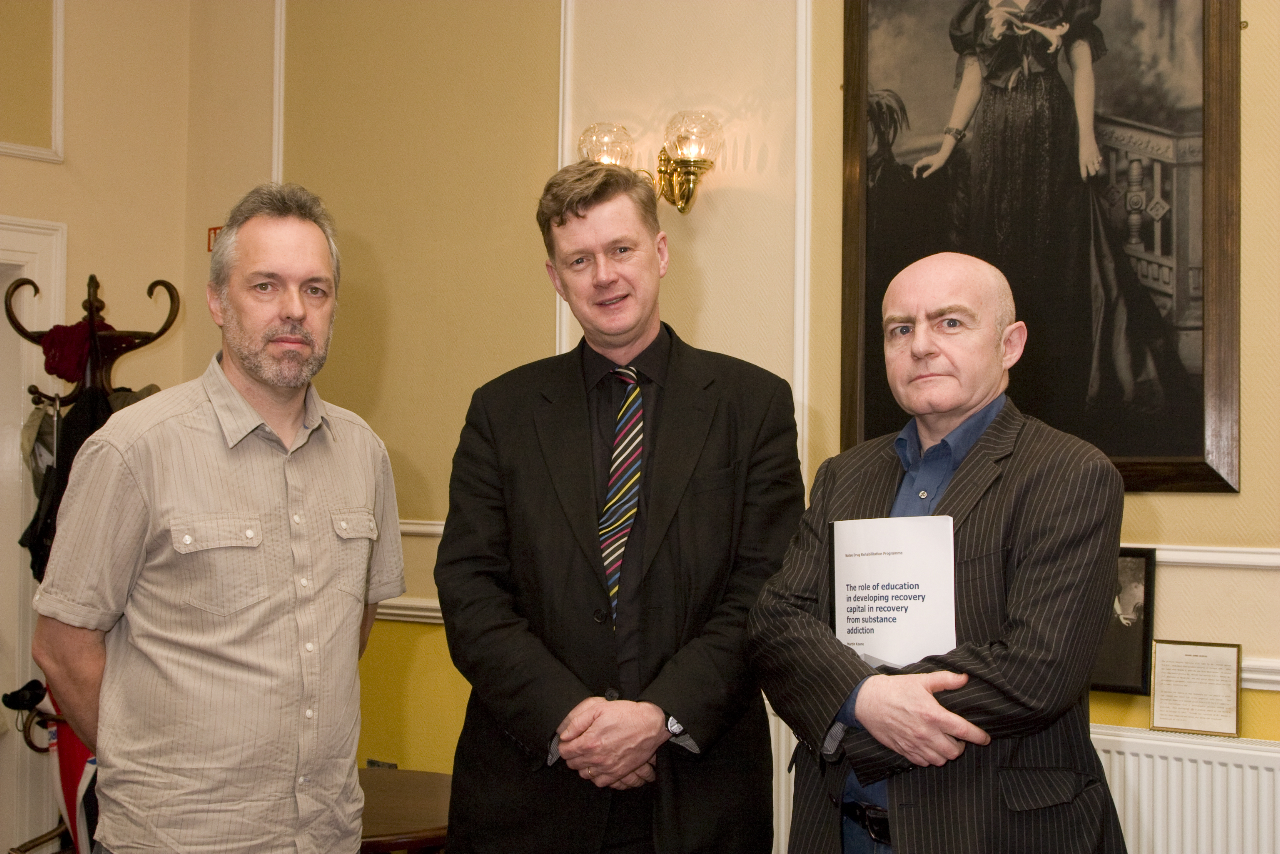Keane, Martin
(2012)
The value of education in drug rehabilitation: report of new research.
Drugnet Ireland,
Issue 40, Winter 2011,
pp. 1-2.
Councillor Emer Costello (former Lord Mayor of Dublin) launched a research report in October 2011 on the role and benefits of education in drug rehabilitation and recovery from addiction.1 The report is derived from an analysis of data from in-depth interviews with 20 individuals in recovery from substance addiction.
All of the people interviewed had progressed through the Health Service Executive (HSE) Soilse drug rehabilitation programme. The data were analysed using the recovery capital framework, which looks at social, physical, human and cultural outcomes. The framework was initially developed by Granfield and Cloud in 1999 2 in their study of 46 individuals who overcame substance dependence without the aid of formal treatment or recourse to self-help groups, and refined by the same authors in 2008.3 The present study with former participants in the Soilse programme was the first attempt to apply the construct of recovery capital to addiction recovery in Ireland.
Most of the interviewees were early school leavers, with modest formal educational achievements, little in the way of sustained employment and a history of having experienced conflict in the home. Since becoming involved in adult education through Soilse, most had achieved third-level degrees or diplomas.
According to Cloud and Granfield,3 recovery capital is the sum of resources necessary to initiate and sustain recovery from substance misuse. The authors identify four dimensions to recovery capital:
Social capital–the sum of resources that each person has as a result of their relationships, support from and obligations to groups to which they belong.
Physical capital–tangible assets such as property and money that may increase recovery options.
Human capital–personalskills and education, positive health, aspirations and hopes; key aspects of human capital, and will help with some of the problem solving that is required on a recovery journey.
Cultural capital–values, beliefs and attitudes that link the individual to social attachment and the ability to fit into dominant social behaviour.
Study findings
This study of 20 people in self-reported recovery from substance addiction demonstrated the contribution that education can make to developing recovery capital. Education played a role in all four dimensions for the participants in this study: it improved social capital by opening up opportunities to develop new networks of friends outside the confines of formal treatment and self-help groups; it improved physical capital by improving career options and job opportunities, which can improve living standards; and it improved cultural capital by exposing people to new values, beliefs and attitudes and instilling a revised work ethic grounded in the demands of educational pursuits. Finally, education contributed to recovery capital by improving human capital, empowering these people to look after their health, become more effective parents, reappraise ingrained negative belief systems, develop achievable goals and improve day-to-day functioning and personal efficacy.
Official treatment programmes can play a vital role in halting addiction and promoting recovery and can benefit people on a number of therapeutic levels. However, when people emerge from treatment they need to transfer these benefits into day-to-day living and also navigate their way into and through real-life situations. Returning to adult education can enable people in recovery to build sufficient recovery capital to assist them on this journey and help them to reproduce their recovery on a day-to-day basis. Drug policy and practice can be strengthened by giving renewed emphasis to the role of education in developing recovery capital. Finally, engaging with adult education while in recovery can open up opportunities for people that can provide them with rewards which they will not risk losing, such as legitimate income, sustainable housing, improved relations with family and a sense that they belong to a community. The importance of these components of sustained recovery is neatly encapsulated by Neale.4
Recovery will only occur if drug users believe that abstinence has more to offer than addiction. Accordingly, recovering drug users must find a purpose for their drug-free lives. To this end, they need meaningful roles and activities that offer them self-respect and pride, and daily routines that do not involve criminal or drug-using activities. …the conditions that seem likely to facilitate successful rehabilitation are the same kinds of conditions that probably prevent drug misuse in the first place. That is, access to a decent income; adequate housing; employment opportunities; family relationships; and being connected to community networks. …these are also key factors motivating most non-addicted members of society... (pp. 218–219)
1.Keane M (2011) The role of education in developing recovery capital in recovery from substance addiction. Dublin: Soilse Drug Rehabilitation Project.
2.Granfield R and Cloud W (1999) Coming clean: overcoming addiction without treatment. New York: New York University Press.
3.Cloud W and Granfield R (2008) Conceptualising recovery capital: expansion of a theoretical construct. Substance Use and Misuse, 43 (12–13): 1971–1986
4.Neale J (2002) Drug users in society. Basingstoke: Palgrave Macmillan.

At the launch of the report: Gerry McAleenan of Soilse, Prof Joe Barry of TCD, and author of the report Martin Keane of the HRB (Photo: JJ Berkeley)
